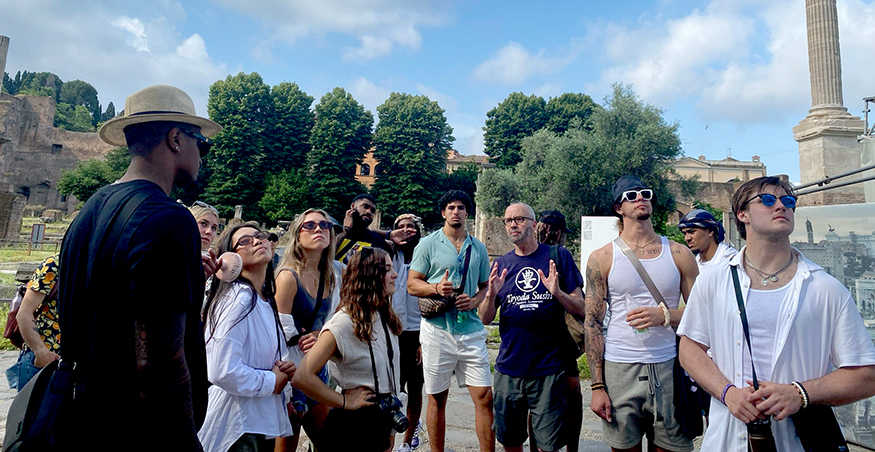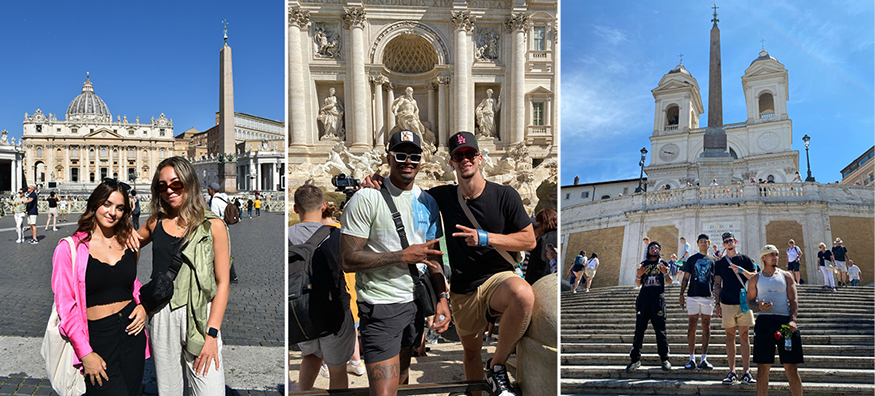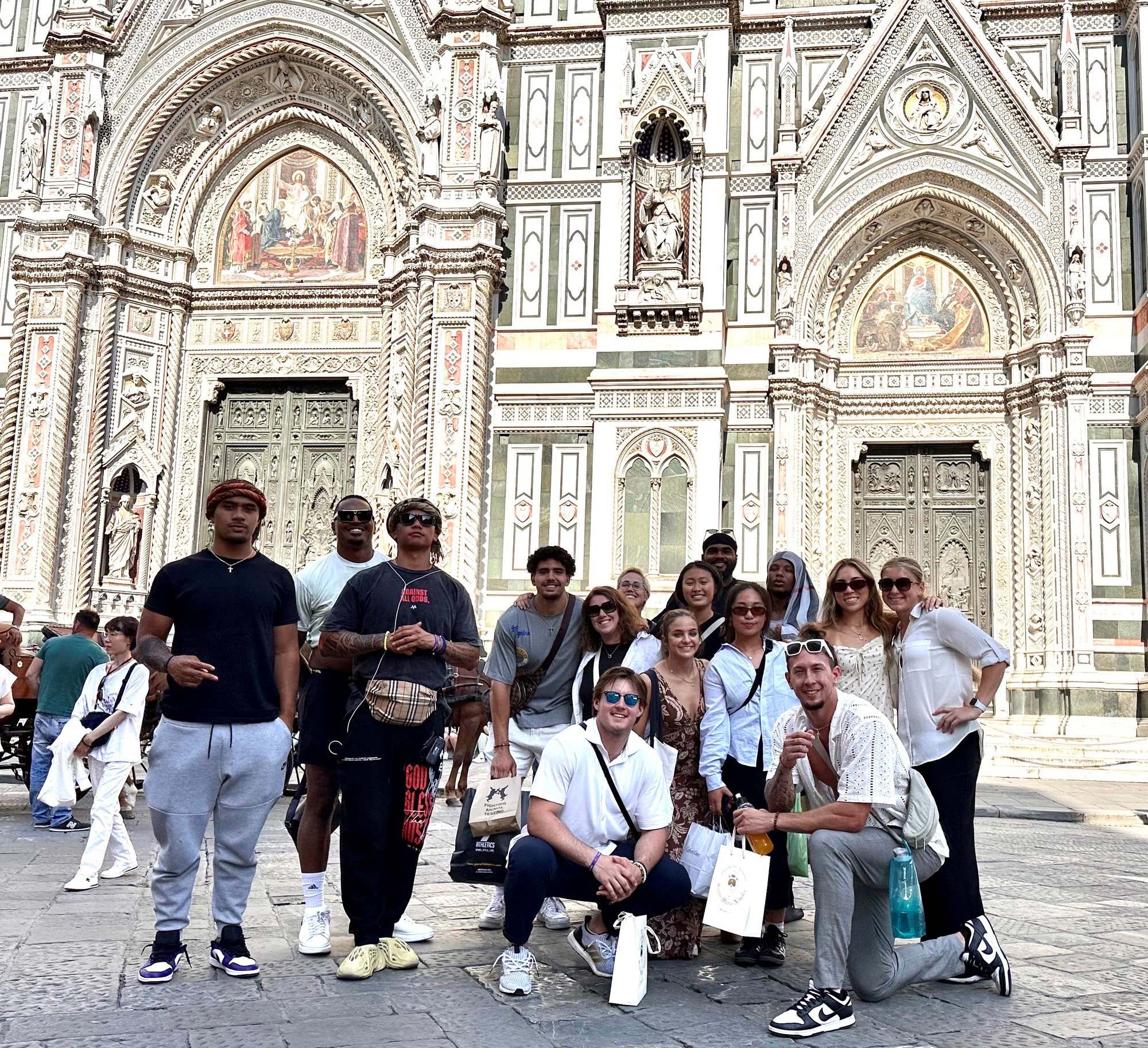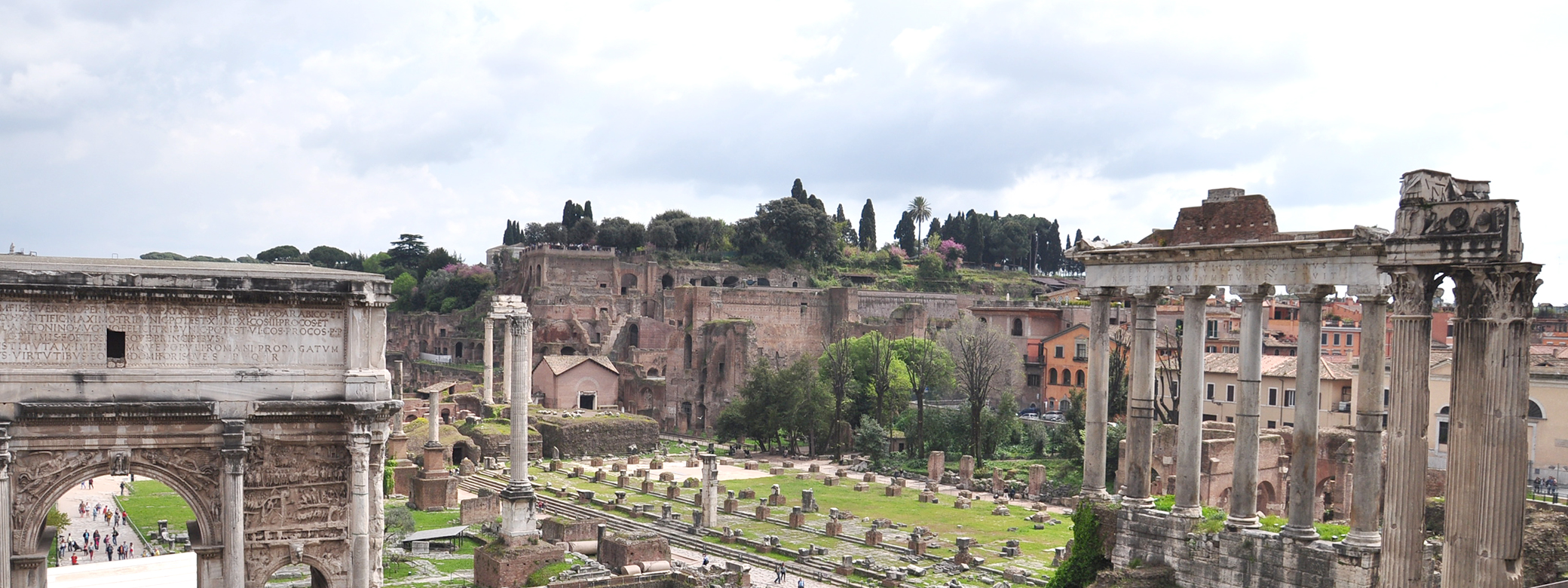
When Huskies linebacker Zion Tupuola-Fetui recently spoke about a meaningful moment from his UW experience, he teared up. The meaningful moment did not take place on a football field. It involved a foreign country and a favorite professor.
Tupuola-Fetui (BA, Comparative History of Ideas) was moved to tears speaking about Jim Clauss, professor of classics in the College of Arts & Sciences, who led a ten-day study abroad program in Rome for UW student athletes. For Tupuola-Fetui, the experience reignited his love of learning, which had waned when classes went online during Covid.
“When I met Jim, the first thing I noticed was his enthusiasm for what he’s teaching,” Tupuola-Fetui recalled, speaking at the UW’s newly renovated Rome Center in June, to an audience that included UW President Ana Mari Cauce and College of Arts & Sciences Dean Dianne Harris. “Jim has an infectious attitude that makes us all want to learn more.”
After participating in the Rome program in 2022, Tupuola-Fetui was so inspired that he signed up again in 2023. “Sadly, my time at school is coming to an end and I don’t think I’ll be able to make it three years in a row,” he told the Rome Center audience, only half joking.
Slowing Down in Rome
Rome was new to Tupuola-Fetui, but Clauss has been leading study abroad programs there for 35 years. Clauss first took Classics students to Rome through a one-quarter program, and then created a ten-day program through the Office of Minority Affairs and Diversity (OMAD), open to OMAD students across campus. Last year he was asked to create a similar program in collaboration with University of Washington Athletics.
It was clearly an absolutely transformational experience for them — exactly the sort of educational opportunity that reshapes the ways our students understand themselves and their place in the world.
Since the pandemic, Clauss has led two trips for Husky athletes – a mix of football players and women from various varsity sports. Before each trip, he met with the athletes to prepare them for what to expect. But there is no way to fully prepare students for an unfamiliar country and language.
Tupuola-Fetui, who had not visited Europe prior to his first Rome trip, recalls a mixture of stress and excitement on his first days in Rome — and the comfort of having familiar teammates at his side. “I was excited to look down every alleyway, down every street, because it was all brand new,” Tupuola-Fetui says. “And when we walked around in our free time and got lost, at least we were lost together. Being with [teammates] made us all more comfortable.”
Most students in the program have little prior experience with ancient history or international travel. Clauss plans the ten-day trip with that in mind. He talks to the students about Roman politics and architecture and culture, but what he emphasizes most — and hopes will endure — is the habit of observation.
“Every now and then I have the students draw something, not because I’m interested in the excellence of their drawing skills, but rather to get them to slow down and look,” Clauss says. “While it’ll be nice if they remember the Forum of Augustus or the Forum of Julius Caesar or the Colosseum, what’s more important to me is that they learn to slow down, look, and be present. Whatever they do in the future, this habit of conscious observation will serve them well.”
So Many Sites, So Many Stories
The group covers considerable ground in ten days. One day is devoted to the Roman Forum, another to the Colosseum. They spend time at the Vatican, visiting both St. Peter’s Basilica and the Vatican Museums, where the final stop is the Sistine Chapel. And they visit Piazza Navona, the site of an ancient Olympic-style stadium. This year, the group squeezed in a day trip to Florence, a two-hour train ride away.
For students, the Colosseum is always a highlight. “You can’t really appreciate the scale of the building unless you are this miniscule being standing next to this immense facility that could hold maybe 80,000 people,” Clauss says.

Clauss tells his students about different gladiatorial fighting styles and gory hunting events held at the Colosseum — precursors to modern mixed martial arts and bull fighting — but also describes elaborate and technologically complex sets that could rival Hollywood. “The wooden floor would open up, scenery would emerge, the floor would close around it, and there you’d be in Africa or the Middle East,” Clauss says. “In the vicinity of the Colosseum there were facilities for scene making and storing arms, and training schools for teaching fighting techniques. There was the headquarters of a company of marines that furled and unfurled the Colosseum’s retractable canvas roof.”
Spend time with Clauss and he’ll share dozens of tidbits like that. At the Roman Forum, he’ll tell stories about Caesar and Augustus. He’ll discuss how religion and politics were intertwined in ancient Rome, and how Roman architecture relates to power and propaganda. He’ll regale students with story after story with a passion that is infectious.
“If you would just let Jim talk, you’d probably be there for hours,” Tupuola-Fetui says, laughing. “He’s got such an outgoing personality and is so unapologetically himself. He’ll say, ‘I’m probably boring you guys’ and then share the coolest fact in the world. His enthusiasm sets the tone for everyone else.”
Embracing New Perspectives
The students’ appreciation of Clauss was evident to those who attended the Rome Center event. (See sidebar.) The guests heard from Tupuola-Fetui, but they also spoke with other student athletes, since the Center’s reopening celebration overlapped with the ten-day study abroad program.

Dean Harris was among those who chatted with students. “Seeing the way study abroad in Rome and Professor Clauss’s class in particular has transformed the lives of our student athletes was the highlight of my trip to Rome,” she says. “It was clearly an absolutely transformational experience for them — exactly the sort of educational opportunity that reshapes the ways our students understand themselves and their place in the world.”
Tupuola-Fetui agrees. “Seeing different walks of life, a different set of concerns, a different lifestyle — just to have that change of surrounding allows you to understand there’s more life out there to be seen and be had,” he says. He and his teammates are already imagining future trips to Europe after graduation.
Clauss is imagining future trips as well. Though he is nearing retirement, his excitement about Rome and his love of teaching is as boundless as ever.
“I’ve evolved as a teacher,” he says. “I feel more that I’m an intellectual guide, helping students discover that they can learn and that learning is intrinsically fascinating and eminently satisfying. So when I’m provided the opportunity to teach, especially in a place like Rome, the switch goes on. I just can’t contain myself.”
More Stories

What Students Really Think about AI
Arts & Sciences weigh in on their own use of AI and what they see as the benefits and drawbacks of AI use in undergraduate education more broadly.

AI in the Classroom? For Faculty, It's Complicated
Three College of Arts & Sciences professors discuss the impact of AI on their teaching and on student learning. The consensus? It’s complicated.

A Love of Classics and Ballroom
Michael Seguin studied Classics at the UW and now owns Baltimore's Mobtown Ballroom. The two interests, he says, are more connected than they might seem.
